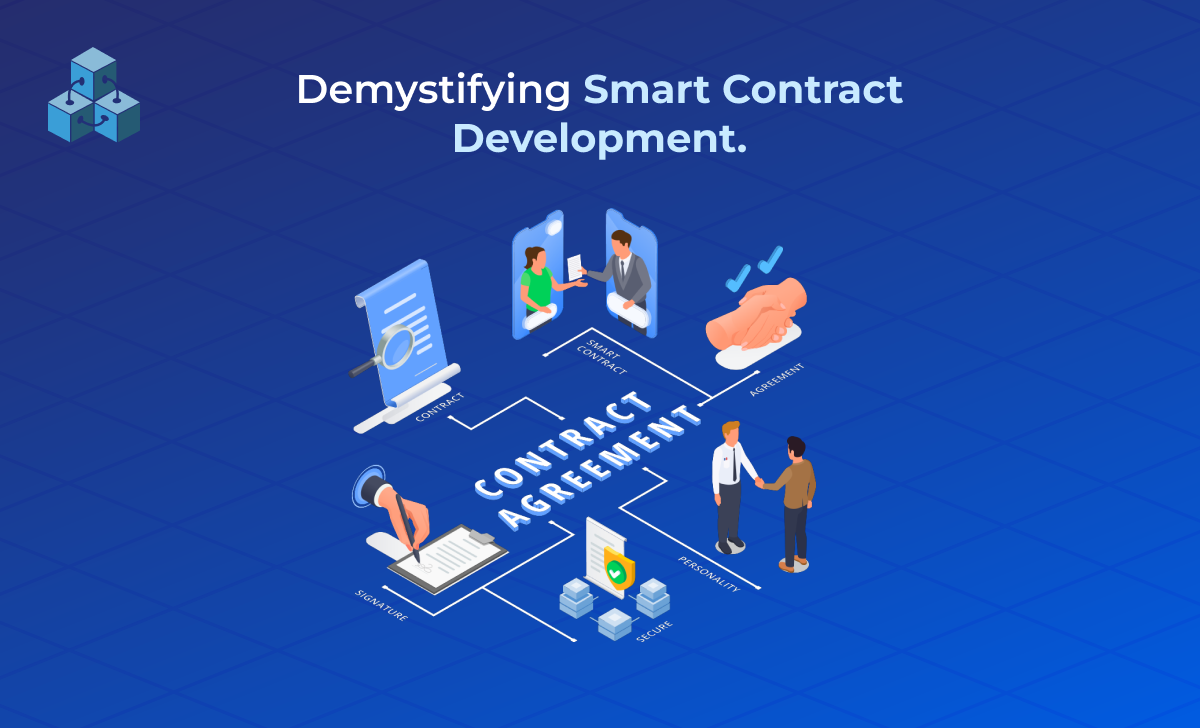In this ever-evolving geography of blockchain technology, decentralized automation via smart contract development has emerged as a revolutionary force. Blockchain technology continues to disrupt various industries with its decentralized, secure and transparent nature. Smart contracts are these self-executing contracts on the blockchain with predefined conditions, eliminating the need for intermediates and enabling automated and trustless interactions between parties. In this blog, we will explore and learn about the massive and transformative potential of decentralized automation that is Smart Contracts and its impact on various industries. From understanding smart contracts to their real-world applications in different sectors, we will dive into how this technology is transforming industries, reshaping the way we conduct transactions in a decentralized world and paving the way for a more efficient and trustless future.
Understanding Smart Contracts
What are Smart Contracts?
Smart contracts are these self-executing digital agreements written in code form running on blockchain networks. These contracts automatically execute predefined actions when met with specific conditions without any third-party intermediate. The contracts are written in code form using if-then statements to trigger actions and operate across a decentralized network enabling trustless transactions as these only execute when met with certain conditions. These ensure transparency and security among the platforms for the users. Smart contracts eliminate the need for human intervention, resulting in reducing the risk of errors and disputes. A blockchain solution which is cost-efficient, tamper-resistant while revolutionizing various industries, including finance, supply chain solutions, and healthcare.
How do Smart Contracts Work?
Smart contracts operate via a combination of blockchain technology, code implementation and decentralized consensus. Here’s a step-by-step explanation of how smart contracts operate: entrepreneurs
- Code Creation:- Smart contracts coded in programming languages. Developers define the rules, conditions, and actions of the contract.
- Deployment on the Blockchain:- After being written, the code deploys onto a blockchain network, where the code becomes a permanent and unchangeable element of the blockchain platform.
- Trigger Conditions:- Smart contract consists of “if-then” statements defining conditions under which the contract executes specific actions. The code depends on variables, data or input from external sources.
- Contract Execution:- As soon the conditions are met smart contract automatically executes on predefined actions. The process involves transferring funds, updating data and interacting with other smart contracts.
- Immutability:- once the contract executes, the outcome and the changes made on the blockchain are permanent and cannot be altered or reversed. The immutability ensures trust and security in contract execution.
- Gas Fees:- Smart contracts consume resources and storage space on the blockchain, so to prevent this misuse, the user pays gas fees.
The Power of Decentralized Automation
- Trustless Transactions:- Blockchain ensures trustless transactions due to its decentralized nature. The smart contract executes only when certain predefined conditions meet. It eliminates the need for intermediates which enhances security and transparency in transactions.
- Cost Efficiency:- Automating the transaction process and eliminating intermediates smart contracts reduces transaction costs and administrative workload making them attractive options for various industries.
- Increased Efficiency and Speed:- The decentralized automation increases the transaction efficiency and speed, allowing for instant settlements and real-time verification, which is valuable in time-sensitive industries like finance and supply chain.
- Enhanced Security and Immutability:- Blockchain solutions use cryptographic hashing and distributed consensus to ensure the immutability and integrity of smart contracts, making them resistant to hacking and tampering.
Real-World Applications Of Smart Contracts
- Finance and Payments:- Smart contracts are transforming financial services, including automated payments, remittances, and peer-to-peer lending platforms.
- Supply Chain Management:- These decentralized automated contracts streamline supply chain management processes, enabling transparent and traceable product movements, automating inventory management and facilitating instant payments.
- Decentralized Autonomous Organizations (DAOs):- These contracts empower DAOs, organizations managed via code and facilitate decentralized decision-making.
- Healthcare and Medical Records:- Smart contracts enhance the security and accessibility of medical records. It ensures the data shared between healthcare providers and patients is safe and secure.
Challenges and Limitations
Smart contracts face various challenges and limitations, such as security vulnerabilities in code, potential hacking, and bugs in code, which can result in the loss of funds. The legal and regulatory implications of smart contracts are still uncertain in periods of enforceability under the traditional legal system. However, the lack of development practices and limited scalability on blockchain networks poses a menace to widespread adoption. Unlocking the full potential of smart contracts requires continuous auditing and testing with improved regulatory clarity.
Conclusion
Decentralization automation through smart contracts is a game-changer revolutionizing various industries by offering transparency, efficiency, and cost-efficient solutions. The power of trustless interactions unlocks new opportunities in supply chain management, financial services and healthcare. As we make our course through the challenges and strive for acceptance, the future of decentralized automation is promising. Decentralization automation will shape a more efficient, trustless, and innovative future for global transactions.
Blockcoders is a leading smart contract development company offering secure and efficient blockchain-based solutions. With our team of skilled developers we provide cutting-edge solutions to enable automated and trustless transactions, transforming industries across. Connect with us today for your next project!
 info@blockcoders.pro
info@blockcoders.pro
 Our global presence :
Our global presence :
 |
|
 |
|
 |
|


